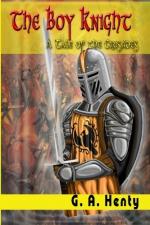The assailants gained ground steadily, the resistance being less severe than Sir Rudolph had anticipated. Several small huts and clearings in the forest which had been used by the outlaws, and round which small crops had been planted, were destroyed, and all seemed to promise well for the success of the enterprise.
It was about two hours after they had left the castle, when a heavy cart filled with fagots was seen approaching its gates. The garrison, who had not the least fear of any attack, paid no attention to it until it reached the edge of the moat. Then the warder, seeing that it contained fagots, lowered the drawbridge without question, raised the portcullis, and opened the gates.
“From whom do you bring this wood?” he asked as the man driving the oxen began to cross the bridge.
“From the franklin of Hopeburn.”
“It is well,” said the warder, “for he is in arrear now, and should have sent in the firewood two months since. Take it to the woodhouse at the other end of the court.”
The heavy wagon crossed the drawbridge, but as it was entering the gate it came suddenly to a stop. With a blow of his ox goad Cnut leveled the warder to the ground, and cutting the cords of the bullocks, drove them into the yard ahead. As he did so the pile of fagots fell asunder, and twelve men armed with bow and pike leaped out. The men-at-arms standing near, lounging in the courtyard, gave a shout of alarm, and the garrison, surprised at this sudden cry, ran to their arms. At first they were completely panic-stricken. But seeing after a time how small was the number of their assailants, they took heart and advanced against them. The passage was narrow, and the twelve men formed a wall across it. Six of them with their pikes advanced, the other six with bent bows standing behind them and delivering their arrows between their heads. The garrison fought stoutly, and although losing many, were pressing the little band backward. In vain the assistant-warder tried to lower the portcullis, or to close the gates. The former fell on to the top of the wagon, and was there retained. The gates also were barred by the obstacle. The chains of the drawbridge had at once been cut. Cnut encouraged his followers by his shouts, and armed with a heavy ax, did good service upon the assailants. But four of his party had fallen, and the rest were giving way, when a shout was heard, and over the drawbridge poured Cuthbert and one hundred and fifty of the outlaws of the forest. Struck with terror at this attack, the garrison drew back, and the foresters poured into the yard. For a few minutes there was a fierce fight; but the defenders of the castle, disheartened and taken by surprise, were either cut down or, throwing down their arms, cried for quarter.
Ten minutes after the wagon had crossed the drawbridge the castle was safely in possession of Sir Cuthbert. The bridge was raised, the wagon removed, the portcullis lowered, and to the external eye all remained as before.




